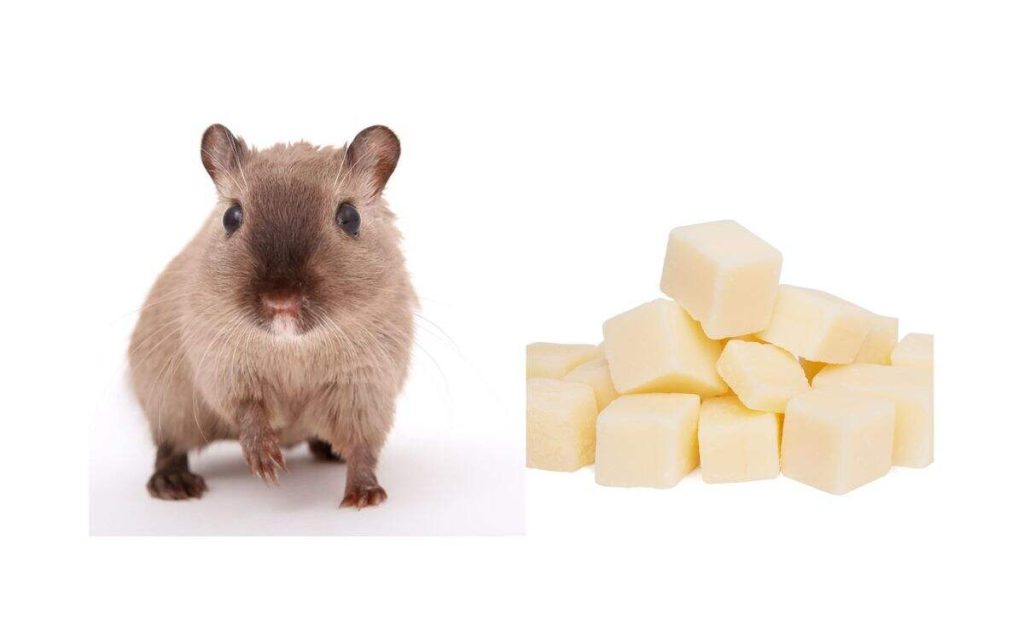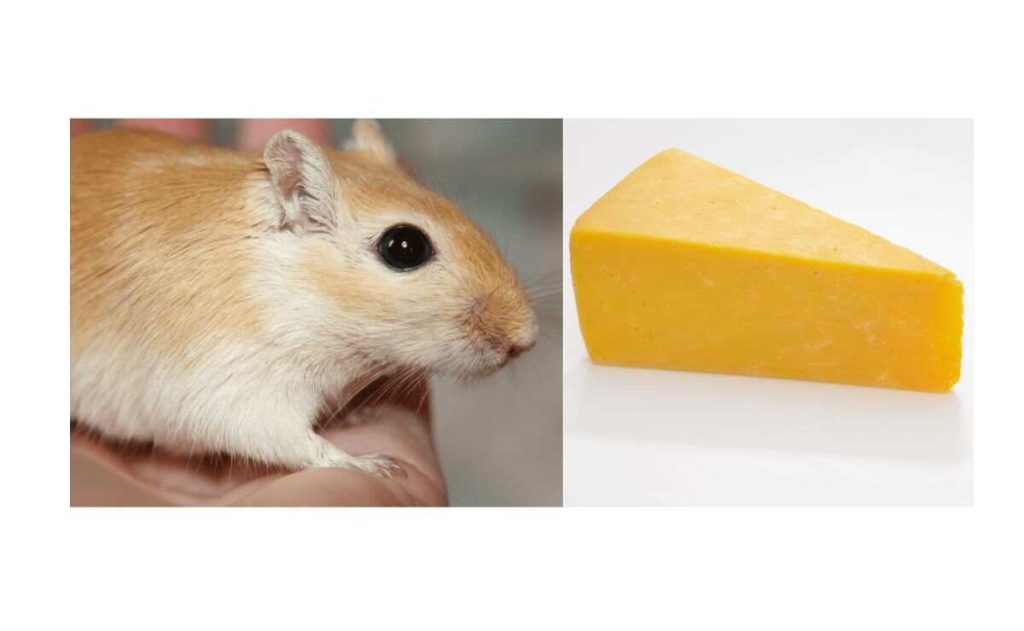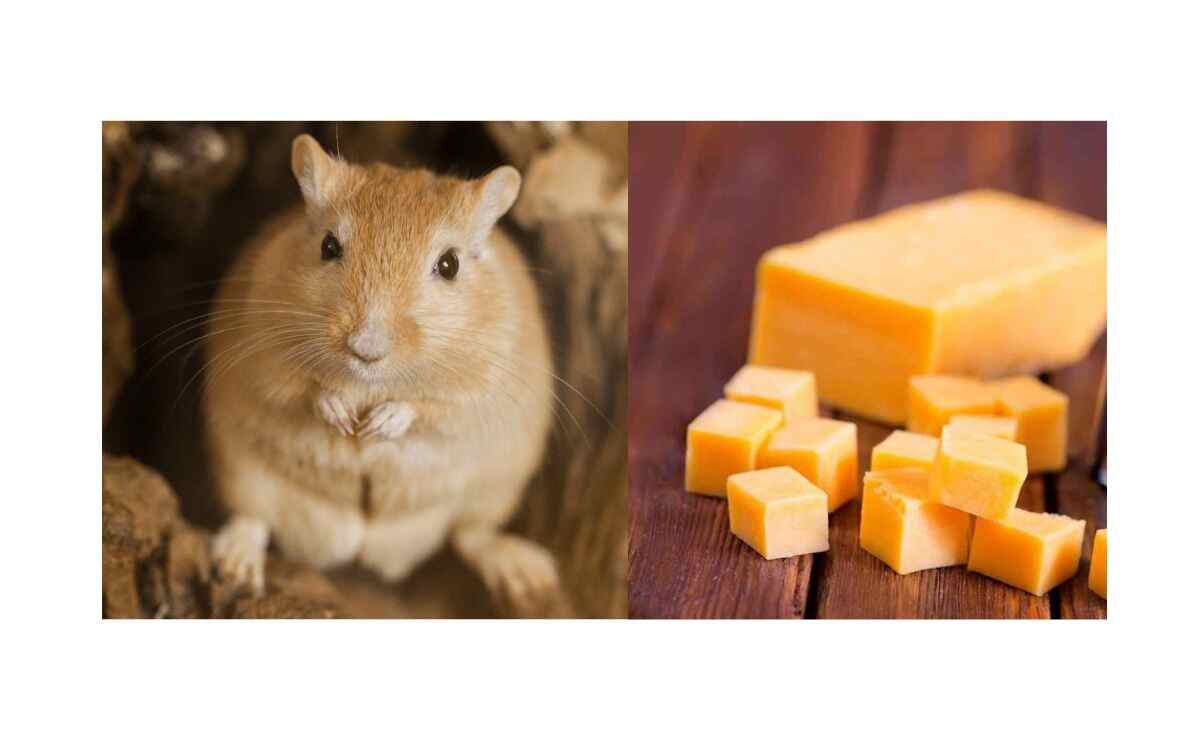Certainly, many of you know that gerbils are lactose intolerant. So it’s an obvious question: can gerbils eat cheese?
Cheese is a dairy product and is not found in gerbil’s natural habitat. But that does not mean they can’t eat it. Yes, gerbils can eat cheese, but only in small quantities. Cheese contains a lot of nutrition that is helpful to your gerbil’s health. Yet, due to their digestive tolerance level, you should feed cheese in moderation.
Can Gerbils Eat Cheese?

Gerbils are adorable and furry companions who bring lots of joy to many households. So it’s your duty to give a healthy and balanced diet.
Gerbils become lactose intolerant after passing the weaning phase (around four to five weeks). Weaning marks the transition from mother’s milk to solid food. Once weaned, gerbils bid farewell to milk consumption for the rest of their lives.
Indeed, gerbils are lactose intolerant, they can eat it. Studies indicate that cheese, particularly aged varieties like cheddar, undergo a transformative process. Bacteria feast on lactose, converting it into lactic acid. This conversion makes the cheese more digestible even for animals with lactose intolerance.
Yet, moderation is the key when introducing cheese into a gerbil’s diet. Despite the reduced lactose levels in cheese, overindulgence can lead to potential issues. Stomach bloating and diarrhea manifest if your gerbil consumes excessive amounts of cheese or other dairy products.
Which Cheese Are Safe For Gerbils?
When it comes to treating your gerbil to a bit of cheese, not all types are created equal. Here’s a guide to safe cheese varieties that your gerbil can munch on, and a heads-up on some to avoid.
Cheddar cheese is one of the better choices for these little rodents. This cheese undergoes an aging process that allows the bacteria to process the lactose it contains. As a result, the lactose is transformed into lactic acid, making it easier for your gerbil to digest. Additionally, much of the whey, which contains most of the lactose, is drained away during the cheese-making process.
Besides cheddar, other cheeses low in lactose includes parmesan, Swiss cheese, cottage cheese, and ricotta. When choosing cheese for your gerbil, checking the ingredients and opting for varieties with lower lactose content is a good practice.
Cheese Options To Avoid By Gerbils
- Cheese Puffs: While cheese puffs don’t pose a lactose intolerance issue for gerbils, they come with their own set of concerns. Cheese puffs lack essential nutrients, containing empty calories without the vitamins and minerals gerbils need.
- Cheese and Onion Chips/Crisps: Similar to cheese puffs, cheese and onion chips or crisps are high in calories but lack the necessary nutrients for gerbils. They don’t provide sufficient protein, minerals, and vitamins required for a balanced diet. Moreover, the high fat and salt content in chips can contribute to unwanted weight gain and dehydration in gerbils.
- Blue Cheese: Blue cheese might be a delight for humans, but it’s a strict no-no for gerbils. The mold present in blue cheese is toxic to them and can lead to severe illness or even death. Ensure that blue cheese is kept far away from your gerbil’s menu.
- Mac and Cheese: While the cheesy goodness of mac and cheese is irresistible for many, it’s best to avoid feeding it to your gerbil. Most processed products, including mac and cheese, do not contribute positively to their health due to additives and processing.
- Cheese Pizza: The delightful combination of cheese, toppings, and grease in a cheese pizza may not align with your gerbil’s nutritional needs. The high-fat content, especially from multiple types of cheese, makes it an unsuitable treat for them.
Do Gerbils Like Cheese?

The delectable flavor of cheese attracts not just humans. Your gerbil, too, can’t resist this savory delight. Gerbils are like mice, they eat everything they can find.
Gerbils find cheese to be a delightful treat. The rich combination of protein and fat in cheese makes it a particularly appealing snack. The protein content satisfies their nutritional needs and contributes to a feeling of fullness.
Cheese serves as a nutrient-packed addition to a gerbil’s diet. The protein and fat content in cheese aligns with their dietary requirements, making it a wholesome choice for an occasional treat.
Still, every gerbil has a particular taste. So some may love it or some not.
How Often Can You Feed Cheese to Gerbils?
Gerbils should avoid excessive fats and salts in their diet, as do many other animals. Unfortunately, cheese tends to contain a high level of these substances. If you want your gerbil to remain healthy, you shouldn’t overfeed them cheese.
You should give cheese to your gerbils as a special treat, not a regular occurrence. Feeding cheese too frequently can lead to health issues such as high blood pressure, stomach problems, and even obesity.
There isn’t a strict quantity of cheese prescribed for gerbils, but a small portion on an occasional basis is the rule of thumb. Feeding your gerbil a small amount of cheese once a week is generally considered safe. Provide cheese alongside their regular pellet food. It will ensure that they still receive essential nutrients and minerals while enjoying a flavorful treat.
Gerbils require more carbohydrates in their diet, and cheese doesn’t quite fit the bill. As a result, limit cheese intake to about half a teaspoon or half of their food in one sitting. This ensures they get a taste of variety without compromising their nutritional balance.
Health Benefits of Cheese for Gerbils
Gerbils love cheese, and it can be good for them in small amounts. Cheese is a little powerhouse of nutrients. It provides necessary calories, protein, fat, sugar, calcium, and sodium.
And that’s not all – cheese also contains goodies like, Vitamin A, Vitamin B-12, Vitamin K, Zinc, etc. It has something called linoleic acid, which might help in preventing obesity. Just remember, a little goes a long way.
Cheese can actually help protect your gerbil’s teeth from cavities. Also, studies suggest that it might be good for the heart. While it’s not a magic fix, adding some cheese to your gerbil’s menu can be a smart choice.
Side Effect Of Cheese
Cheese is a tasty treat for humans, but for gerbils, it’s not the healthiest option when given in large amounts.
Cheese packs a punch with fats and proteins, more than gerbils actually require. Excessive intake can lead to an imbalance in their diet. Gerbils need a mix of nutrients, and too much fat and protein from cheese can be unhealthy for them.
Even though cheese won’t harm gerbils, dairy products, in general, are not the best choice for them. A pet specialist suggests steering clear of dairy for gerbils and opting for grains and seeds as their primary food source.
While cheese is not toxic to gerbils, it can cause digestive problems due to lactose intolerance. Gerbils, like humans, produce enzymes called ‘lactase’ to break down lactose. However, when gerbils wean and stop drinking their mother’s milk, they also stop producing lactase. This can lead to digestive issues such as flatulence, diarrhea, bloating, cramps, and nausea.
The digestive problems caused by lactose intolerance might not be life-threatening for gerbils, but they are certainly unpleasant. Diarrhea can even lead to infections, creating further health complications for your furry friend.
Conclusion
Gerbils enjoy the taste of cheese. But you have to feed it in moderation. Because they have some digestive limitations like lactose intolerance.
While cheese is generally safe for gerbils in small quantities, excessive consumption can lead to health issues, including obesity. So if you want to keep gerbil’s optimal health, it’s advisable to primarily provide a diet consisting of grains, seeds, and limited amounts of fruits and vegetables.
As a pet owner, offering occasional tasty treats can be a delightful way to bond with your gerbil. If you decide to treat your pet with cheese, do so in small amounts to maintain a healthy balance in their diet.
